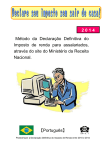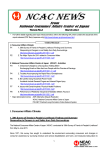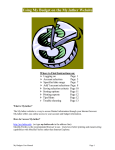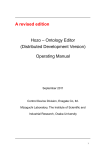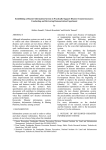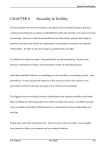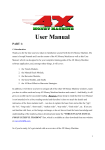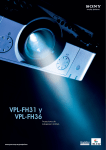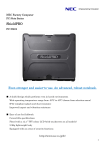Download NCAC NEWS(Vol.22,No.6)
Transcript
NCAC NEWS From National Consumer Affairs Center of Japan Vol.22 No.6 * March 2011 For further details regarding each topic introduced below, refer to the following URL which contains the actual text of the reports released (PDF files) (Japanese only):http://www.kokusen.go.jp/news/news.html * Major abbreviated names: ADR: Alternative Dispute Resolution NCAC: National Consumer Affairs Center of Japan PIO-NET: Practical Living Information Online Network System * Explanation for terms used: E-mail for Consumer Problems: The internet-based system designed for NCAC which receives emails from consumers reporting information about issues they have experienced. Injury Information System: It was established by NCAC aiming to collect safety hazard information (information detailing cases where consumers suffered life-threatening or physical hazards from faulty products or services) and risk information (information detailing accident cases where consumers were potentially subject to physical hazards from faulty products or services) from nationwide consumer centers and cooperating hospitals collecting safety hazard related information through the internet and then to analyze in order to prevent the occurrence of similar problems and to hold back the expansion of the existing problems. -Inside of this issue- Consumer Affairs Climate 2p 10 Main topics for 2010 related to consumer issues 2p Summary of “E-mail for consumer problems” for the first half of 2010 Activities of the National Consumer Affairs Center of Japan (hereinafter ‘NCAC’) (1) Surveys 3p 4p 5p 6p 7p 8p 9p 10p 10p Beware of trouble regarding “credit card cashing!” Part 2: In addition to cashing for obtaining a loan, there are also cases in which users use cashing through introduction Beware of stay-at-home work for mobile sites! Some consumers forced to produce cash when paying for site production cost Trouble regarding services that suddenly appear at the door to purchase precious metals: They will not return once the metals are in their hands Beware of door-to-door sales of tuna and bonito! Threatening selling methods with knife in hand to offer a sample to taste Do not respond to fictitious invoices from the “Kokumin Seikatsu Soudan Center” Beware of “horse racing forecast information services” that lure consumers through unjust solicitation: Do not be lured by sales talk such as “sure profits”, “fixed races”, and “setup races” Beware once again of phone calls proclaiming to be the National Consumer Affairs Center of Japan (NCAC) regarding survey on damage relief! Service charges billed with every bid…! Beware of trouble related to “penny auctions!” Confirm gift certificates and gift vouchers which will become invalid! Rapid increase in inquiries and complaints made to local consumer centers (2) Product testing 11p Safety of rotating clothes hangers 1 Consumer Affairs Climate 10 Main topics for 2010 related to consumer issues Every year, NCAC reviews consumer issue topics of the year which gathered social attention as well as topics which were received frequently as consumer consultation in order to select and announce that year’s “10 main topics related to consumer issues.” 2010 marked the first anniversary since the inauguration of the Consumer Affairs Agency and Consumer Commission but it was a year that also came with many new consumer issues. 10 main topics related to consumer issues ・Rapid increase in investment related issues as well as unlisted stock, corporate bonds, and trading in foreign currency ・Escalation of issues related to settlement services for credit cards used in online transactions ・Complete enactment of the revised Moneylending Control Act and yet, issues in credit card cashing. ・Increased trouble in easy side businesses using the Internet such as affiliate or drop shipping arrangements. ・Increase in malicious soliciting for houses, condominium sales and housing renovation. ・Heightened awareness toward automobile safety in response to floor mat accidents. ・Increased activity for prevention of accidents among children as seen through the cigarette lighter regulations. ・Start of the “Consumer Hotline” (0570-064-370) a common nationwide phone number that receives consultation from consumers. ・The new “Basic Consumer Plan” is formulated. ・Various reviews conducted on the choking accidents caused by konjac jelly as well as decisions made by district courts. Summary of “E-mail for consumer problems” for the first half of 2010 The E-mail for consumer problems was launched in April 2002 as an online system to quickly gather information on the actual condition of consumer problems. Eight and a half years have passed since that time. As of FY2010, decisions were made to summarize and disclose consumer problems in the first half and second half of the year for quick information sharing. The following is an overview for the first half of 2010 including the number of reports received as well as a summary of the main topics which were followed up on. Overview of reports received Changes in the number of reports received 5267 reports were received in the first half from April to September 2010 and this is already close to 70% of the reports received in all of FY2009. Also in comparison to the 3350 reports received during the same period of the previous year, this signifies an increasing trend. Access to the E-mail for consumer problems The number of access to the E-mail for consumer problems for the first half of FY2010 totaled 98438, which is 128% in comparison to the same period of the previous year. The number of access to the FAQ page was 47146, which already exceeds the number of access to the same page for all of FY2009. Sender attributes As with FY2008 and FY2009, close to 70% of the senders in the first half of FY2010 were men. By age, more than half of the total senders were those above 40, and by occupation; there has been an increase in “self-employed, freelance” and “unemployed” users. Major topics that were followed up on Communication service related 2 ・Distribution sites (e.g. Mobile standby screens) where cancellation methods are difficult to understand ・Carrier agencies that solicit consumers through misleading explanations ・Mobile phone companies that force users to sign for options that are not mandatory ・Carriers that do not provide information on cancellation methods and other guidance on their corporate homepage Online shopping related ・Users were charged a shipment fee by a mail order company regardless of the fact that the user fulfilled the conditions for free shipping ・PC software companies that do not provide notification regarding automatic renewals on the purchase screen Real estate related ・Lease broker that forces customers to purchase the optional room disinfection service Education/ language related ・English conversation schools that do not hold classes according to the schedule posted on the homepage ・Certification courses that charge a physical checkup fee in addition to the course fee Loyalty point card related ・Hair salons that eliminate their point cards without giving prior notice to consumers ・Self-service gasoline stations where change is paid by point cards Damage/safety related ・Malfunction by bathroom dryer/heaters Disclosed topics ・Accidents by “roller shoes” that is popular among children. Accidents involving others in addition to bone fracture suffered by the users themselves (Announced on May 26, 2010) ・Sickness caused by 3D films (Announced on August 4, 2010) ・Increasingly malicious condominium solicitations (Announced on November 25, 2010) Addition and updating of FAQ items New items have been added gradually to FAQ or Frequently Asked Questions section since February 2009 and currently there are more than 100 items on the page. Activities of NCAC (1) Surveys Beware of trouble regarding “credit card cashing!” Part 2: In addition to cashing for obtaining a loan, there are also cases in which users use cashing through introduction NCAC announced a report on April 7, 2010 in regards to trouble involving “credit card cashing” but the troubles continue to increase even after the announcement and full enforcement of the revised Moneylending Control Act. In addition to cashing for the purpose of obtaining a loan, cases where consumers who cannot pay for a separate transaction are introduced by the company to pay using “credit card cashing” are becoming more and more noticeable. Number of consumer reports In preparation for this announcement, NCAC conducted a close investigation once again of data registered to PIO-NET and tallied the results. Since 2005, there have been 1,032 reports regarding “credit card cashing”, of which 282 cases were reported for FY2010 up to October-end 2010. By year, the number of reports made by unemployed consumers is rising. 3 Main examples of inquiries and complaints Looking at the example of inquiries and complaints, there are many cases where consumers use “credit card cashing” for the purpose of obtaining loans as living expenses and returning debts. Meanwhile, there have been an increasing number of cases where consumers are introduced to “credit card cashing” by companies when making a payment for a separate transaction. Examples of separate transactions include paying registration fee for part time jobs and stay-at-home work or paying for gambling information fees. Beware of stay-at-home work for mobile sites! Some consumers forced to produce cash when paying for site production cost Reports regarding stay-at-home work for mobile sites have been received by local consumer centers nationwide. Reports state, “I applied to a part time job after seeing a newspaper insert ad/ local magazine. After sending in my resume and a copy of my driver’s license, I was told that I needed to have a homepage for mobile phones (hereinafter “mobile site”) in order to work and I signed a contract but I would like to cancel.” These issues first appeared around March 2010 and have been on the rise. In such business practices involving stay-at-home work for mobile sites, consumers are solicited that “they can earn high income while working at home” and that “homepages are necessary for the job.” Later they are billed for mobile site production cost and registration fees. This is also known as mobile phone work–at-home or mobile work-at-home. Consumers refuse once after learning that cost will be necessary when initiating work but in cases where they have already sent their personal information through resumes and copies of driver’s licenses, they are threatened that “they cannot run away” and are forced to sign the contract, unable to flatly refuse the matter. In some malicious cases, consumers who refuse by saying that “they cannot make the payment” are told that “the job promises future profit” and that “there is a system that guarantees income.” Eventually they are driven to squeeze out cash by borrowing from consumer finances, using credit card cashing, or producing cash by using the shopping limit of their credit card. In addition, some of them are forced to sign multiple contracts on the grounds that they need to pay for production cost of updated websites and are ended up paying large amounts. As we enter the year-end holiday season, there will be more people searching for part-time-jobs and sideline jobs during the break, thus the abovementioned issues are expected to increase. In an effort to prevent further increase of such issues through similar methods, NCAC offered information to consumers so that they will not sign contracts easily even if they are told that they need to pay mobile site production costs in order to gain work. Number of Inquiries and Complaints Inquiries and complaints regarding mobile site work-at-home have been gathered through PIO-NET since March and the number of reports has reached 231 cases as of those registered up to November 20th. Examples of inquiries and complaints ・Consumer was demanded to pay the bill in a threatening tone of voice when they refused to pay for the mobile site production cost. ・Consumer was forced to pay for the mobile site production cost by borrowing from a consumer financing company. ・Consumer was forced to pay for the mobile site production cost specifically by using credit card cashing. ・After consumer was forced to pay the registration fee through cash transfer, he/she was forced to send a copy of the transfer slip and was billed once again after confirming the balance of the consumer’s account. Issues identified through inquiries and complaints Solicitation method Regardless of the fact that there is no mention in the classified ad regarding costs necessary for working, 4 the consumers are billed approximately 400,000 yen after hire based on the grounds that a mobile site production cost is necessary for the job. Payment method In some cases, the company demands cash payment and to those consumers who do not have cash at hand, they force the consumer to produce cash without regard to their payment capability by encouraging cashing, credit card cashing, or borrowing from consumer finance companies. Contract method Though there is a possibility that such contracts apply as a Business Opportunity Related Sales Transaction under the Specified Commercial Transaction Law, the company does not issue legal documents and thus, the transaction is not recognized for cooling off. Response to consumer when requesting cancellation In many cases, the company does not acknowledge the issue as a Business Opportunity Related Sales Transaction under the Specified Commercial Transaction Law and does not respond to negotiations from local consumer centers. Advice to consumers ・Carefully consider signing the contract if you are asked to pay large amounts of money in order to work. ・Ask for a full explanation before signing the contract and confirm the contract in writing. ・Avoid payments that rely on future income. ・Do not produce cash through credit card cashing, loans, and other methods that are beyond your capability. ・In case of trouble, consult your nearest consumer center. Trouble regarding services that suddenly appear at the door to purchase precious metals: They will not return once the metals are in their hands Recently, inquiries and complaints have started to gather at local consumer centers across the nation regarding schemes in which consumers are visited at their home and asked to sell kimonos or accessories using precious metals such as gold and platinum. Details of the inquiries and complaints include “the broker’s solicitation was forceful and frightening and I had no choice but to agree to the purchase” “I had them buy precious metals but when I asked for a cancellation since the price was too cheap, they told me that they had already provided documents that state that cancellations are not accepted” “I had to write down the ID number of my health insurance card. I am worried that my personal information will be misused.” The number of cases where consumers are visited suddenly by brokers, persuaded to sell goods, and led to sign contracts without time to make rational decisions are noticeable. In most cases, precious metals that are handed to brokers who visit consumer homes cannot be retrieved even when requested. Since the beginning of FY2010, the number of complaints regarding door-to-door purchase schemes has been on a rapid increase with 538 cases thus far (66 in comparison to the same period of the previous year) and due to the particularly large number of reports from the elderly, NCAC has organized the issues and called out to consumers. Number of inquiries and complaints gathered through PIO-NET Number of inquiries and complaints 774 inquiries and complaints have been gathered from FY2007 up to the end of November 2010 and the number of cases has been increasing rapidly since 2010. Attribute of consumers who agreed to the contract The greatest number of inquiries and complaints are received from those consumers 60 years and older who have signed contracts. In FY2010, the average age was 63.8 years old. Because contracts are signed upon home visit, there are a greater number of women, and by occupation; there is a greater number of homemakers and unemployed people involved. 5 Examples of inquiries and complaints ・I was requested to sell precious metals incessantly by a broker who initially came to my door offering to buy kimonos and I could not turn them down out of fright. ・A broker was looking for precious metals inside the home of an elderly person with dementia. ・I am having trouble with a broker that comes to solicit me incessantly every night. ・I asked for cancellation because of the cheap purchase price but was rejected. ・I showed the broker a precious metal and they purchased it before I knew it. I do not know their name or their contact information. ・I gave my personal information to a broker and I am worried that it will be misused. Issues identified through inquiries and complaints ・Consumers are unexpectedly confronted and persuaded to sell their belongings and forced to sign contracts without time to compare and consider whether the purchase price is reasonable or not. ・In cases where a buyer calls upon a consumer’s home and the consumer signs a contract to sell their precious metals, it is difficult to apply the Specified Commercial Transaction Law. ・There are brokers that carry out incessant and forceful solicitation. ・Consumers are not handed a written document which lists details such as type and price of the object that was bought at the purchase. ・When buying objects such as precious metals, the consumer’s private information on health insurance cards and driver’s licenses are written down and there are many inquiries expressing concern that they may be misused. ・Once objects fall into the hands of the broker, they are not returned even upon request in most cases. Advice to consumers ・If you have no intention of having your belongings purchased, flatly reject the offer. Items that are handed to the broker once are extremely difficult to retrieve so carefully consider whether you should sign the contract or not. If you experience any fright such as the broker refusing to leave your home upon request or they pressure you to bring out any goods, call the police. ・Avoid responding to a broker alone. When you decide to have a visiting broker purchase items, have family members or a neighbor accompany you and try not to deal with them alone. ・Confirm what kind of broker you are dealing with. In addition to confirming the broker’s address and phone number before signing the contract, ask them to present their broker permit in order to confirm and write down their information. Do not sign contracts with brokers who do not respond adequately to such consumer requests. ・Ask brokers to provide documents that clearly state the conditions of purchase. Confirm the grounds used for calculating the purchase price (e.g. how much for one gram) as well as conditions for purchase and have them provide this in writing and store a copy of this document. ・In case of trouble, consult your nearest local consumer center or the police. Beware of door-to-door sales of tuna and bonito! Threatening selling methods with knife in hand to offer a sample to taste There have been an increasing number of reports that consumers were forced to buy seafood such as tuna and bonito from door-to-door salesmen offering a “sample to taste.” Though door-to-door sales of fresh foods became subject to the “Act on Specified Commercial transactions” in December 2009, it is difficult to recover the damage in most cases since the consumer does not know the vendor name or their contact information. Therefore, NCAC has called out to consumers to avoid hasty purchase. 6 Main examples of inquiries and complaints ・I was forced to purchase damaged fish through forceful high-pressure selling. ・When I tasted a sample, the salesman banged on the cutting board with his knife and I purchased the product out of fright. ・The salesman cut the fish without asking and threatened me when I refused purchase. Advice to consumers ・If you are not interested, turn them down without hesitation. ・Do not sign contracts easily since the name and contact information of the vendor is unclear in most cases. ・In case of trouble, consult your local consumer center immediately. Do not respond to fictitious invoices from the “Kokumin Seikatsu Soudan Center” Since December, there has been a chain of inquiries sent to local consumer centers and NCAC asking, “I received a postcard from a company called the Kokumin Seikatsu Soudan Center (‘National Consumer Affairs Consultation Center,’ Tokyo Setagaya Ward) stating “Request for confirmation on third party notice.” What is this about?” NCAC has no relation whatsoever with this company. If you receive a postcard from the said company, do not contact them under any circumstance. If you feel the smallest of anxiety, please contact NCAC or your nearest consumer center. Examples of inquiries and complaints ・I received a postcard asking for confirmation on a third party notice sent from what seems like a consumer consultation center. The writing states, “This is a request for confirmation and is not a third party notice” “If there are no objections filed within 2 weeks, the plaintiff’s complaint will be accepted.” The postcard mentions invoice for unpaid fees but I have no such recollection. What should I do? (Received in December 2010, female, 50’s, homemaker, Saitama prefecture.) ・I received a postcard for a “request for confirmation on a third party notice” from an organization whose name is strikingly similar to a national consultation agency. The postcard states, “Suspicion of unpaid fees or violation of regulations have been confirmed and proven by the company that you have contracted with and a bill of complaint has been filed against you to the summary court in the judiciary branch of your government” but I have no idea what this is about. I am providing you the information. (Received in December 2010, female, 70’s, unemployed, Chiba prefecture.) ・A postcard titled third party notice was delivered to my father. The notice asks for confirmation that a company that my fathered signed a contract with in the past has filed a lawsuit for unpaid fees or violation of regulations but my father says that he has no recollection of such events. What should I do? (Received in December 2010, male, 20’s, student, Saitama prefecture.) Advice to consumers ・The postcard from these companies state, “please contact us immediately even if you have no recollection of such events” but do not contact them under any circumstance since this is a fictitious invoice. If you contact them, there is a risk that the company will draw out your personal information. ・Even if you have contacted the company, do not respond to any billing from them. ・If you have any information, please contact NCAC or your nearest consumer center. 7 Beware of “horse racing forecast information services” that lure consumers through unjust solicitation: Do not be lured by sales talk such as “sure profits”, “fixed races”, and “setup races” “I have information on horse races that will bring profits without fail” “Do you want to buy information since there is a “fixed race” set up?” ”I will give you special information on the horses. I’ll pay you a guarantee if it goes wrong.” “There is a “setup race” where winning order is decided through discussion. I’ll tell you the order if you pay the information fee. It will bring sure profit.” 7557 inquiries and complaints such as the above, related to malicious “horse racing forecast information services” have been received in the approximately 5 years from FY2005 to FY2010. (Those registered as of December-end 2010 present. Same applies below.) NCAC has called out to consumers regarding issues related to these malicious “horse racing forecast information services” while also placing a request to the Japan Racing Association (JRA) to give another warning regarding such malicious “horse racing forecast information services.” Overview of inquiries and complaints gathered through PIO-NET Changes in the number of inquiries and complaints Inquiries and complaints regarding horse racing forecast information services reached 1711 cases in FY2009 and 1667 cases in FY2010 (896 cases in the same period of the previous year) and the number of cases received in FY2010 is growing at a pace that exceeds that of FY2009. Attribute of consumers who sign contracts ・By age By age, 1624 cases were by those in their 40’s (21.5%), 1344 cases were those in their 30’s (17.8%), 1329 cases were those in their 50’s (17.6%), indicating that more than half of those who sign contracts are those between their 30’s and 50’s. ・By gender By gender, 6046 are men (80.0%) and 1414 are women (18.7%), meaning that approximately four-fifths of the consultations are by men. ・By occupation 4133 cases are by salaried workers (54.7%), 1641 cases are by those unemployed (21.7%), 582 cases are by self-employed/freelance workers, and 441 cases are by homemakers (5.8%), meaning that more than half of the consultations are from salaried workers. Contract purchase price, payment method, sales/purchase format ・Contract purchase price (excluding those cases that are unclear or not responded) In regards to contract purchase amount, the largest group was 100,000 to less than 500,000 yen with 1514 cases followed by the bracket of 1M to less than 5M yen with 1018 cases. The total amount of contract purchase reaches approximately 4.836 billion yen and the average contract purchase price is approximately 893,000 yen. ・Payment method Cash payment accounts for 76.7% of the overall with 5798 cases. ・Sales/purchase format Mail-order sales is 5518 cases (73.0%) and telemarketing is 1190 cases (15.7%) indicating that most of the sales are made through mail-order or telemarketing. Main case examples of inquiries and complaints ・Consumers are solicited tactfully that “it is a safe bet” and demanded information fees. ・Consumers are solicited by offering to provide “information on fixed races.” ・Consumers are solicited based on the fact that the company holds information on “setup races” and are led to borrow debts. ・Consumers are led to trust the company through solicitation that “they will guarantee the paid money.” ・Consumers are solicited that “the race is fixed but JRA acknowledges this.” ・Consumers are taught methods for credit card cashing. 8 Issues identified from case inquiries and complaints ・The solicitation method is deceitful. ・Consumers are billed expensive information fees although they were told that information was free or cheap. ・Consumers are taught methods for credit card cashing and driven to get a loan. ・Company cannot be contacted or the company does not respond to negotiations. Advice to consumers ・Do not be deceived by sales talk and writing that “promises profit.” ・Do not go out of your way and make debts in order to pay money for horse racing forecast information ・Be aware that there is extremely small possibility that your money will be returned. ・Racing forecast and purchase of betting tickets shall be made under one’s responsibility and decision. Beware once again of phone calls proclaiming to be the National Consumer Affairs Center of Japan (NCAC) regarding survey on damage relief! There have been several reports of phone calls from those identifying themselves to be NCAC made to people who have purchased unlisted stock and corporate bonds in the past. Under no circumstances will NCAC contact a person who has never consulted the center or make phone calls to them regarding damage relief and surveys or inquire about details of past contracts as a countermeasure against damage caused by unlisted stock. If you receive such phone calls, do not give them your personal information or sign new contracts and instead, contact your nearest consumer center. Examples of inquiries and complaints Case 1: I recently received a phone call by a person identifying him/herself as a staff person at NCAC and was told, “I am calling today to recover damage for those who purchased unlisted stock in the past. The company you purchased unlisted stock from is a well-known fraudulent company. The company has produced many victims.” Furthermore, I was told, “If you immediately contact securities company “A”, you can recover your damage.” Are there cases when national consultation agencies make such phone calls? (Received on December 2010, male, 60’s, self-employed/ freelance worker, Tokyo) Case 2: I have purchased unlisted stock in the past. The other day, I received a phone call from someone disguising him/herself as being from NCAC and was told, “A vicious company called A will be charged in the near future. If you have unlisted stock for this Company A, you should consult securities company “B.” They will help you out.” I’d like to pass on the information since I did not think that this phone call was made by your center. (Received on December 2010, male, 70’s, unemployed, Fukushima prefecture) Case 3: I received a phone call from a person proclaiming to be from NCAC and was told, “As a request from the central government, we are now calling consumers who have purchased unlisted stock in the past to call out for warning. Your name has been found on the name list by a fraud group for unlisted stock. Please be careful.” Does NCAC ever contact consumers directly regarding such matters? (Received on December 2010, male, 70’s, unemployed, Tokyo) Related information On June 9, 2010, NCAC has announced, “Beware of phone calls proclaiming to be the National Consumer Affairs Center of Japan (NCAC) regarding survey on damage relief” 9 Service charges billed with every bid…! Beware of trouble related to “penny auctions!” Recently, there has been in increase of inquiries and complaints regarding “penny auctions” where brand new electronics and brand items are sold online for extremely cheap prices. With a regular online auction, there is no cost for bidding and only the successful bidder needs to pay for the bid product. However, a major feature of “penny auctions” is in that bidders must pay a service charge in order to bid regardless of the outcome of the bid. Local consumer centers across the nation have been receiving reports mainly from consumers who were lured by the outrageously cheap prices of the auctioned items and used the auction without understanding its mechanism. Therefore, NCAC has introduced the issues related to “penny auctions” as a warning to consumers. Main examples of inquiries and complaints ・I became immersed in the bidding and ended up with only service charges. ・I continued bidding because I thought my service charges would go to waste if I gave up. ・I bid successfully but the invoice bill was expensive in the end. ・I am suspecting the possibility of decoys. ・I bid successfully but the bid was canceled because the auctioned item was unavailable. Advice to consumers ・Exercise care when using penny auctions. ・If you decide to participate, remember to maintain calm judgment. ・“Currency” will not be refunded once purchased. ・Do not use suspicious sites. ・In case of trouble, consult a local consumer center. Confirm gift certificates and gift vouchers which will become invalid! Rapid increase in inquiries and complaints made to local consumer centers In accordance with the enactment of the “Act on Settlements” in April 2010, there are an increasing number of gift certificates that are being carried through refund procedures and becoming invalid. Recently, local consumer centers across the nation have been receiving many inquiries and complaints such as, “I heard that gift certificates will become invalid, is this true?” “What should I do to get a refund?” In response to this situation, NCAC has provided information that consumers should confirm the refund term of subject gift certificates and take a prompt action. Number of inquiries and complaints The number of inquiries and complaints gathered at local consumer centers across the nation has been increasing rapidly since December 2010 and the number beyond April 2010 has reached 242 cases. Examples of inquiries and complaints ・I learned through the news that some gift certificates will become invalid even if it is before the expiration date. Please tell me which gift certificates apply. ・I saw news on TV reporting that gift certificates will become invalid. Does this mean I will not be able to use the gift certificates I have now? ・I saw an article in the newspaper regarding gift certificates that will become invalid. Please give me the contact information so that I can request a refund. Advice to consumers ・Confirm subject gift certificates and gift vouchers on the Financial Service Agency and NCAC homepage, and confirm directly with the issuers of the gift certificate and gift voucher for details and other questions. ・If you have gift certificates and gift vouchers that will become invalid, confirm the refund terms and complete the 10 procedures as quickly as possible. Information list regarding refund for gift certificates and gift vouchers that will become invalid ・Regarding refund of gift certificates (prepaid cards) (Financial Service Agency) ・Gift certificate/prepaid cards/e-money, etc. (Information on collection and free repair) (NCAC) (2) Product testing Safety of rotating clothes hangers Rotating clothes hangers that take up little space and yet capable of storing many clothes, are sold on home shopping channels and Internet stores. Many are assembly type products in which clothing is hung on the ring or bar-type hanger on the upper part of the product and the pole with a rotating mechanism such as a wheel or bearing makes it rotate, thus enabling storage and removal of clothing. Some products come with 2 rungs and many measure more than 2 meters in height. From FY2005 to October-end 2010, PIO-NET has received 77 inquiries and complaints regarding rotating clothes hangers with some cases reporting injuries such as “I used the hanger in my tatami room but it fell over and I suffered bruises on my legs and back” as well as reports related to quality and danger of the product such as, “the pole became bent when I hung clothes on it.” Accordingly, NCAC decided to conduct tests on 16 brands of rotating hangers sold online stores, focused on the hazard and safety of the product. The risk of collapse during use and sufficient durability are tested and the results were provided to consumers. Main test results Test conditions ・The test was conducted by hanging clothing equal to the load capacity. Hangers that did not reach the load capacity after hanging the maximum number of clothes possible on the hanger section were tested as is. Safety when moving ・When hangers with clothing hung at the maximum load capacity were made to move inside a tatami mat, some products fell over because the wheel was incapable of changing directions, while some products were impossible to move at all. The wheels on some products deformed and scraped against the frame above. ・When hangers with clothing hung at the maximum load capacity were made to move on a wooden floor, some hangers were impossible to move because the wheel faced sideways. In addition, as with the tatami mat, the wheel became deformed on some products and scraped against the frame above. Smoothness of rotation with clothes attached ・When a section of the hanger was rotated with clothing hung at the maximum load capacity, the rotating wheel did not turn smoothly and in some products, the hanger did not rotate and instead, forced the base wheel to move. Stability when clothing is concentrated in one section ・When clothing is concentrated in one section, some products fell over easily even when there were only a small number of clothes hung. Loose bolts and nuts ・In some cases, bolts and nuts became loose during the test, resulting in tilted poles and greater instability. Tests based on SG mark certification standards ・When the hanger was placed with double the weight of the maximum load capacity and left as is for 24 hours, the wheel became deformed and scraped against the frame above on some products. ・When the hanger was placed with double the weight of the maximum load capacity and rotated, the pole on some products tilted, thus inhibiting rotation, losing balance, and falling over. In addition, the poles on some 11 products tilted slightly after rotating 10 times. ・None of the brands exhibited damage or deformation when the displayed load capacity was applied to the pole section on one side of the hanger and left as-is for 24 hours. Labeling ・Some brands did not display the load capacity or the number of storable items on neither the online sales site nor the user manual. ・None of the brands provided mention on their sales site regarding the locations to set up the product. ・Some products did not display the company address and phone number on the user manual. Advice to consumers ・Be careful as the pole may tilt or the product may fall over if there are too many clothes on the hanger. ・Be careful as the product may fall over when moved while clothing is hung on the product. ・Make sure to hang clothing in a balanced fashion so that they do not concentrate in one spot. ・Make periodic confirmation for any loose bolts and nuts. ・Confirm product measurements, place of assembly, and place of set up. Request to suppliers ・Improve those product that lack durability and stability ・On the online sales site and in user manuals, provide information on total weight of clothing that can be used on the hanger as well as the number of clothing items that can be used in wording that is easy to understand. ・On the online sales site, provide information on the product size and set up location in wording that is easy to understand. ・Display the name, address, and phone number of the manufacturer, importer, and vendor on the user’s manual. 12













